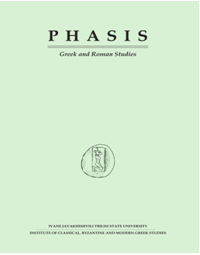The Vocabulary of Prometheus Bound in the Context of Aeschylean Poetics
DOI:
https://doi.org/10.60131/phasis.17.2014.2334Abstract
Resembling a detective-style investigation by philologists, one can assume that this level of philological 'peril' or suffering as that found in Prometheus Bound by scholars seeking to identify the text’s authorship, has rarely received approval in the history of world literature. While many researchers have attempted to find a resolution to this conundrum, none of them appears to have the Olympic strength that is necessary to arrive at the finish line of reconciliation. In actuality, Prometheus’s authorship enigma is "one of the most intriguing problems in the history of literature" and still remains unresolved. Despite the fact that the paper underlines several times the authorship puzzle of Prometheus Bound, it does not seek to imply that its goal is to approve or disprove the Aeschylean authorship of the text. The modest goal of this paper is to demonstrate methodological possibilities of the Digital Humanities when tasked with the analysis of an author’s use of vocabulary. The paper demonstrates the above goal with an example that aims to compare the frequency of vocabulary analysis in relation to the text of Prometheus Bound with extracted Aeschylean, Sophoclean and Euripidean Corpora data and to closely situate Prometheus Bound to one of three tragedians’ corpus. The comparative frequency analysis of most used words in four corpora, comparison of average rates between Aeschylean, Sophoclean, Euripidean and Prometheus Bound’s Corpora and the semantic maps designed by top five words of each corpus showed that the Prometheus Bound is comparable to Aeschylean Corpus, it is dissimilar from the Sophoclean Corpus and does not coincide semantically with the Euripidean Corpus – the fact that could be aiding forth in creating an argumentum for supporting the Aeschylean authorship of the play.
Downloads
Published
Issue
Section
License
Copyright (c) 2014 PHASIS

This work is licensed under a Creative Commons Attribution-NonCommercial 4.0 International License.


